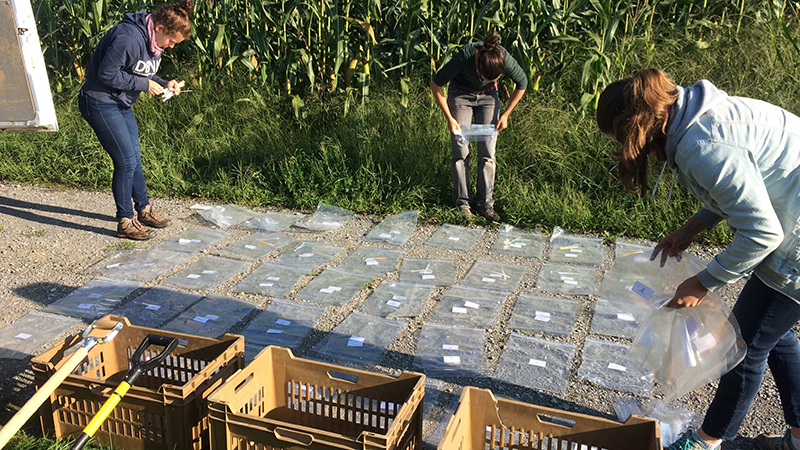Farmland often harbours a multitude of pathogens which can attack plants and reduce yields. A Swiss research team comprised of Agroscope, the Universities of Basel and Zurich as well as FiBL has shown that inoculating soil with mycorrhizal fungi can help maintain or even improve yields without the use of additional fertilizers or pesticides. In a large-scale field trial, plant yield increased by up to 40 percent.
Intensive use of fertilizers and pesticides on fields reduces biodiversity and pollutes the environment. There is therefore great interest in finding sustainable ways to protect yields without the use of agricultural chemicals. One example of alternative biologicals is mycorrhizal fungi, which are beneficial organisms that help plants acquire nutrients.

A team of researchers from the universities of Zurich and Basel, Agroscope and the Research Institute of Organic Agriculture FiBL has now shown for the first time on a large scale that the application of mycorrhizal fungi in the field works. The fungi were mixed into the soil before sowing crops on 800 trial plots at 54 maize farms in northern and eastern Switzerland. “On a quarter of the plots, the mycorrhizal fungi enabled up to 40 percent better yields. That’s huge,” says the study’s co-lead Marcel van der Heijden, a soil ecologist at the University of Zurich and at Agroscope. But there’s a catch: on a third of the plots, the yield did not increase and in some cases even decreased. The research team was initially unable to explain why this happened.
In their search for the cause, the researchers analysed a variety of chemical, physical and biological soil properties, including the biodiversity of soil microbes. “We discovered that the inoculation functioned best when there were lots of fungal pathogens already in the soil,” says co-first author Stefanie Lutz from Agroscope, the federal centre of competence for agricultural research. “The mycorrhizal fungi act as a kind of protective shield against pathogens in the soil that would weaken the plants.” As a result, the normal yield can be maintained in fields where without mycorrhizal fungi there would have been losses. In contrast, mycorrhizal fungi had only a minor effect on fields that were not contaminated with pathogens. “The plants there are strong anyway and grow excellently. The use of mycorrhizal fungi in such cases brings no additional benefits,” says the other first author Natacha Bodenhausen from FiBL.
The aim of the study, funded by the Gebert Rüf Foundation, was to be able to predict the conditions under which mycorrhizal inoculation works. “With just a few soil indicators – mainly soil fungi – we were able to predict the success of inoculation in nine out of 10 fields, and thus could also predict the harvest yield even before the field season,” says the study’s co-lead Klaus Schläppi of the University of Basel. “This predictability makes it possible to target the use of the fungi in fields where they will work. That’s a crucial element for developing these technologies into a reliable agricultural method,” says Schläppi.
Further research is still required to find out the easiest way to spread the fungi over large areas. Nevertheless, “the results of this field trial represent a big step toward more sustainable agriculture,” concludes Marcel van der Heijden.
The study discussed Stefanie Lutz, Natacha Bodenhausen et al. Soil microbiome indicators can predict crop growth response to large-scale inoculation with arbuscular mycorrhizal fungi. Nature Microbiology, 29 November 2023. DOI:10.1038/s41564-023-01520-w
